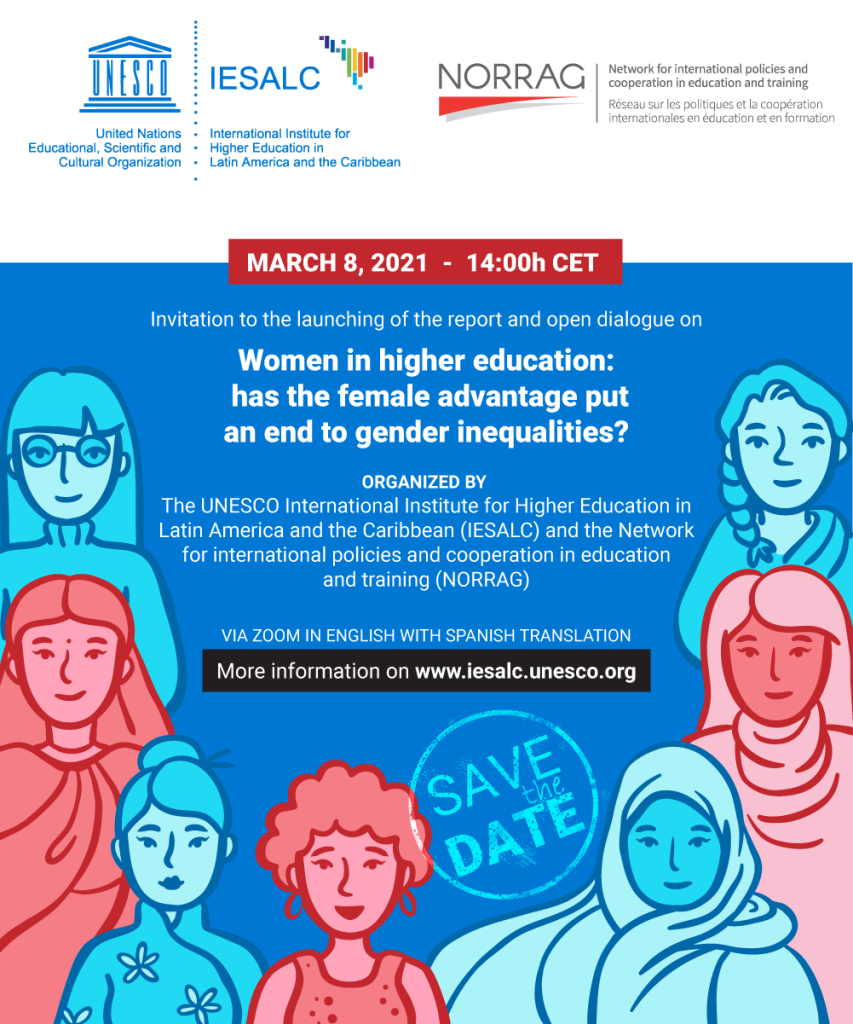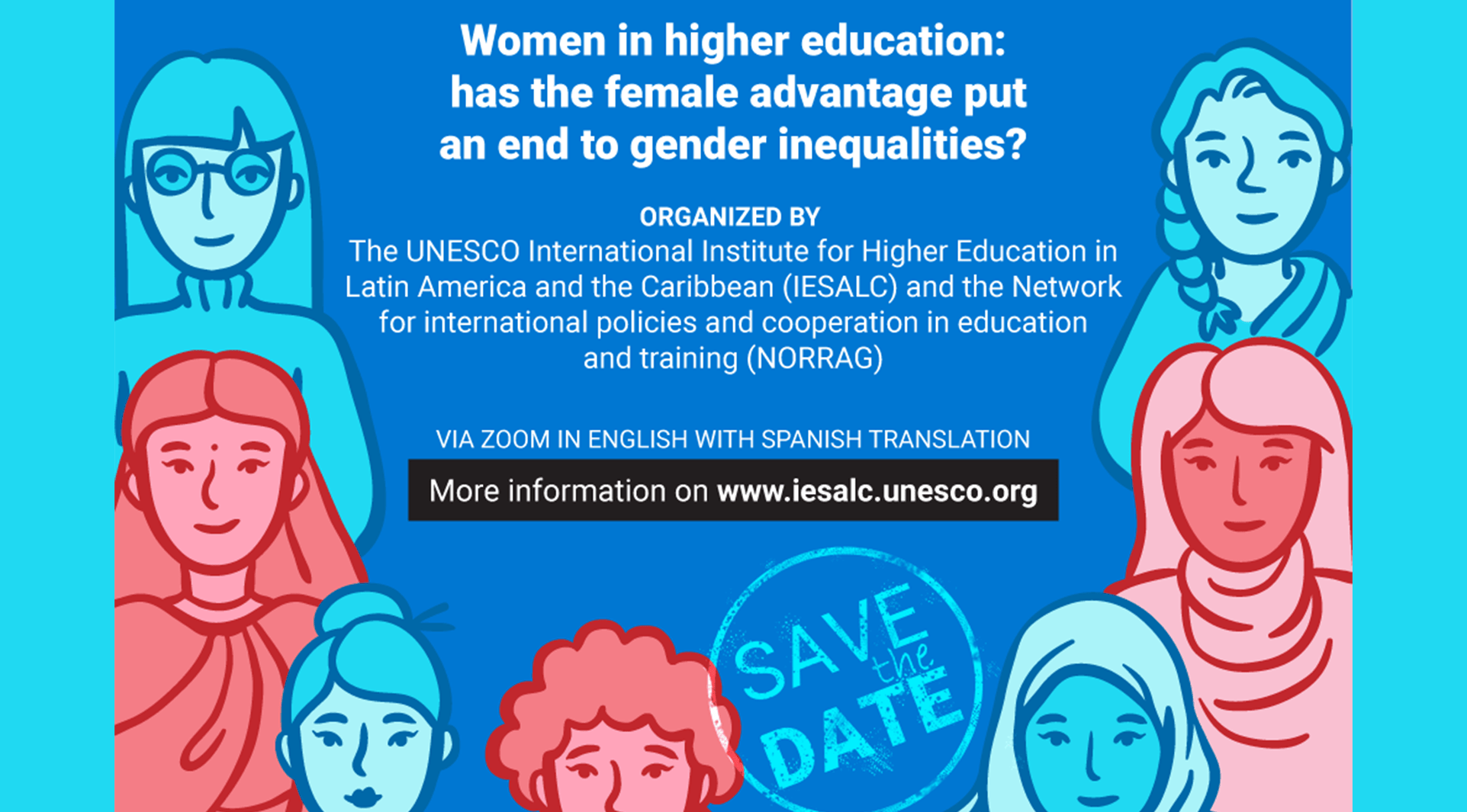Event Highlights - Women in higher education: has the female advantage put an end to gender inequalities?
To commemorate International Women’s Day on March 8, NORRAG and the UNESCO International Institute for Higher Education in Latin America and the Caribbean (IESALC) hosted a webinar entitled, “Women in higher education: has the female advantage put an end to gender inequalities?”
The event was streamed via Zoom on 8 March at 9:00h Caracas | 14:00h Paris & Geneva | 17:00h Nairobi | 19:30h Mumbai | 22:00h Tokyo | in English with simultaneous Spanish interpretation.

Following welcoming remarks by Stefania Giannini (UNESCO Assistant Director-General for Education) and Moira Faul (NORRAG Executive Director), Daniele Vieira (Research Coordinator and Policy Analyst) presented and officially launched UNESCO-IESALC’s comparative report on the female advantage in higher education and the persistence of gender-based inequalities.
Afterward, scholars and practitioners from all over the world held a dialogue concerning the findings of the report and the current status of women’s participation in their regions of expertise. Panelists included: Woohyang Chloe Sim, Researcher, Waseda University Faculty of Education and Integrated Arts and Sciences (Regional expertise: Gulf States); Rekha Pappu, Associate Professor, Azim Premji School of Education at the Tata Institute of Social Sciences (Regional expertise: South Asia); Ann Therese Ndong-Jatta, Director of the Multi-Sectoral Office in Nairobi for East Africa (TBC), and José Antonio Quinteiro, Programs Coordinator at UNESCO IESALC (Latin America and the Caribbean).
Panelists addressed the following questions:
- What is the current status of the participation of women in higher education (as students, faculty or managers) in your region and where do gender-based inequalities persist?
- What policies, either at national or institutional level, seem to work in your region?
- What prospects do you see for the future in your region, particularly looking at the Sustainable Development Goals of the 2030 Agenda?
After these eye-opening presentations, panelists responded to questions from the audience. The director of the UNESCO-IESALC, Francesc Pedró, brought the meeting to conclusions.
View the full programme below and find additional information on the UNESCO-IESALC website.
| Programme | |
| 14:00h – 14:10h | Welcome remarks by Francesc Pedró / UNESCO IESALC Director / Stefania Giannini, UNESCO ADG / Moira Faul, NORRAG Executive Director |
| 14:10h – 14:15h | Presentation of the agenda, participation rules for panelists |
| 14:15h – 14:30h | Launching of the report Women in higher education: has the female advantage put an end to gender inequalities?, by Daniele Vieira, research coordinator |
| 14:30h-15:30h | Open dialogue by Woohyang Chloe Sim, Researcher, Waseda University Faculty of Education and Integrated Arts and Sciences (Regional expertise: Gulf States); Rekha Pappu Associate Professor, Azim Premji School of Education at the Tata Institute of Social Sciences (Regional expertise: South Asia); Ann Therese Ndong-Jatta (TBC), Director of the Multi-Sectoral Office in Nairobi for East Africa; and José Antonio Quinteiro, IESALC Programs Coordinator (Latin America and the Caribbean) |
| 15:30h – 15:40h | Questions from the audience |
| 15:40h – 15:45h | Conclusions Francesc Pedró |
| 15:45h – 15:50h | Closure and final portrait |
إطلاق تقرير اليونسكو– IESALC: المرأة في التعليم العالي
دخلت نوراغ في شراكة مع UNESCO-IESALC لإطلاق تقريرها، “المرأة في التعليم العالي: هل أدّت ميزة الإناث إلى وضع حد لعدم المساواة بين الجنسين؟” في 8 مارس 2021 تكريما لليوم العالمي للمرأة. سيتم عرض فيديو الحدث قريبًا على مواقع نوراغ و UNESCO-IESALC ، في غضون ذلك، يمكنكم قراة التقريرهنا.

